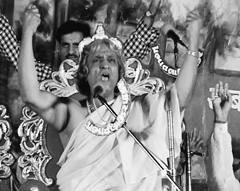Final Solution
 INDIA / 2004 / Hindi, Gujarati, English / Color / Video / 150 min
INDIA / 2004 / Hindi, Gujarati, English / Color / Video / 150 min
Director, Script, Editing, Sound, Producer: Rakesh Sharma
Photography: Rakesh Sharma, Tanmay Agarwal
Assistant Director: Archana Menon
Source: Rakesh Sharma
An examination of the 2002 massacre of Muslims in the western Indian state of Gujarat captures the antagonism between India’s Muslim and Hindu populations. Hindu political parties advocating an orthodox India clash with and oppress the Muslim community. The testimonies of both Hindus and Muslims illustrate the origin and intensification of the animosity. The director’s sincere attempt to face this seemingly insolvable conflict is deeply moving.
[Director’s Statement] Post-9.11, we live in a world where politics of hate and intolerance has not only gained mainstream acceptance, but has even grabbed center stage. The political Right seems to be tightening its stranglehold across Europe and USA, nationalism being fueled by anti-immigrant and anti-Muslim rhetoric. The “War on Terror” dominated electoral discourse in the U.S. presidential elections, with each candidate promising to “hunt ’em and kill ’em” better than the other. In a world where it has become legitimate to use fictitious intelligence to justify the bombing of innocents in Iraq, where it has become acceptable to launch precision bombs and rockets against non-“embedded” journalists, where shameless politicians divide up oil wells and farm out reconstruction contracts for their $36 million bonuses, where babies are killed and mutilated as acceptable “collateral damage,” we face a challenge greater than ever before.
We have lived through many dark periods in history, often justifying our barbarism by using similar rhetoric. Hate, despair, destruction and tragedy cannot possibly help create harmonious societies and a democratic world.
During the making of this film, I noticed shocking parallels between 2002–2004 India and 1930s Germany. Genocidal violence supported by the state against Muslims in Gujarat has continuing impact—segregation in schools, ghettoization in cities and villages, formal calls for an economic boycott of Muslims and attacks on intelligentsia by right wing Hindutva cadres.
Unchecked and unchallenged, the rapid rise of politics of hate and intolerance could very well be the forerunner of a 21st century Endlosung—the Final Solution.
 Rakesh Sharma
Rakesh Sharma
Rakesh Sharma began his film and TV career in 1986 as an assistant director on Shyam Benegal’s Discovery of India. His broadcast industry experience includes the set up and launch of three broadcast channels in India: Channel [V], Star Plus and Vijay TV. He has now gone back to independent documentary filmmaking. His last film, Aftershocks: The Rough Guide to Democracy (2002), won Best Documentary (Feature) at the Big Mini-DV (USA) and Jeevika (India) film festivals in addition to eight other awards at various festivals in 2002 and 2003. The film was screened at over 100 international film festivals including the EARTH VISION 11th Tokyo Global Environmental Film Festival. Aftershocks was rejected by the government-run Mumbai International Film Festival in 2002. |
